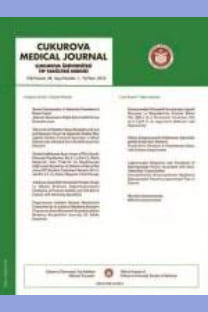Klinik farmakoloji teratoloji risk analizi ile gebelikte kardiyovasküler ilaç kullanımının güvenilirliği
Teratoloji, Kardiyovasküler ajanlar, Gebelik, Farmakoloji
Reliability of cardiovascular drug use in pregnancy with clinical pharmacology teratology risk analysis
Teratology, Cardiovascular agents, Pregnancy, Pharmacology,
___
- 1. Fretts RC, Schmittdiel J, McLean FH, Usher RH, Goldman MB. Increased maternal age and the risk of fetal death. N Engl J Med. 1995;333:953-7.
- 2. Cunningham FG, Leveno KJ. Childbearing among older women--the message is cautiously optimistic. N Engl J Med. 1995;333:1002-4.
- 3. Kaplan YC, Karadaş B, Küçüksolak G, Ediz B, Demir Ö, Sozmen K et al. Counselling pregnant women at the crossroads of Europe and Asia: effect of Teratology Information Service in Turkey. Int J Clin Pharm. 2017;39:783-90
- 4. Roos-Hesselink JW, Ruys TP, Stein JI, Thilén U, Webb GD, Niwa K et al; ROPAC Investigators. Outcome of pregnancy in patients with structural or ischaemic heart disease: results of a registry of the European Society of Cardiology. Eur Heart J. 2013;34:657-65.
- 5. Balci A, Sollie-Szarynska KM, van der Bijl AG, Ruys TP, Mulder BJ, Roos-Hesselink JW et al; ZAHARAII investigators. Prospective validation and assessment of cardiovascular and offspring risk models for pregnant women with congenital heart disease. Heart. 2014;100:1373-81.
- 6. Loane M, Dolk H, Kelly A, Teljeur C, Greenlees R, Densem J; EUROCAT Working Group. Paper 4: EUROCAT statistical monitoring: identification and investigation of ten year trends of congenital anomalies in Europe. Birth Defects Res A Clin Mol Teratol. 2011;91:31-43.
- 7. Barr M Jr. Teratogen update: angiotensin-converting enzyme inhibitors. Teratology. 1994;50:399-409.
- 8. Oppermann M, Padberg S, Kayser A, WeberSchoendorfer C, Schaefer C. Angiotensin-II receptor 1 antagonist fetopathy--risk assessment, critical time period and vena cava thrombosis as a possible new feature. Br J Clin Pharmacol. 2013;75:822-30.
- 9. Weber MA, Schiffrin EL, White WB, Mann S, Lindholm LH, Kenerson JG et al. Clinical practice guidelines for the management of hypertension in the community: a statement by the American Society of Hypertension and the International Society of Hypertension. J Clin Hypertens (Greenwich). 2014;16:14-26.
- 10. Pieper PG. Use of medication for cardiovascular disease during pregnancy. Nat Rev Cardiol. 2015;12:718–29.
- 11. Regitz-Zagrosek V, Roos-Hesselink JW, Bauersachs J, Blomström-Lundqvist C, Cífková R, De Bonis M et al; ESC Scientific Document Group. 2018 ESC Guidelines for the management of cardiovascular diseases during pregnancy. Eur Heart J. 2018;39:3165-241.
- 12. Perez-Aytes A, Marin-Reina P, Boso V, Ledo A, Carey JC, Vento M. Mycophenolate mofetil embryopathy: A newly recognized teratogenic syndrome. Eur J Med Genet. 2017;60:16-21.
- 13. Kang HH, Ahn KH, Hong SC, Kwon BY, Lee EH, Lee JS et al. Association of citalopram with congenital anomalies: A meta-analysis. Obstet Gynecol Sci. 2017;60:145-53.
- 14. Orbach H, Matok I, Gorodischer R, Sheiner E, Daniel S, Wiznitzer A et al. Hypertension and antihypertensive drugs in pregnancy and perinatal outcomes. Am J Obstet Gynecol. 2013;208:301.e1-6.
- 15. Hassouna A, Allam H. Limited dose warfarin throughout pregnancy in patients with mechanical heart valve prosthesis: A meta-analysis. Interact Cardiovasc Thorac Surg 2014;18:797–806.
- 16. Xu Z, Fan J, Luo X, Zhang WB, Ma J, Lin YB et al. Anticoagulation regimens during pregnancy in patients with mechanical heart valves: A systematic review and meta-analysis. Can J Cardiol 2016;32:1248.e1–9.
- 17. D’Souza R, Ostro J, Shah PS, Silversides CK, Malinowski A, Murphy KE et al. Anticoagulation for pregnant women with mechanical heart valves: A systematic review and meta-analysis. Eur Heart J 2017;214:351–351.
- 18. Bates SM, Greer IA, Middeldorp S, Veenstra DL, Prabulos AM, Vandvik PO. VTE, thrombophilia, antithrombotic therapy, and pregnancy: Antithrombotic Therapy and Prevention of Thrombosis, 9th ed: American College of Chest Physicians Evidence-Based Clinical Practice Guidelines. Chest. 2012;141:e691S-736S.
- 19. Nishimura RA, Otto CM, Bonow RO, Carabello BA, Erwin JP 3rd, Guyton RA et al; ACC/AHA Task Force Members. 2014 AHA/ACC guideline for the management of patients with valvular heart disease: executive summary: a report of the American College of Cardiology/American Heart Association Task Force on Practice Guidelines. Circulation. 2014;129:2440-92.
- ISSN: 2602-3032
- Yayın Aralığı: Yılda 4 Sayı
- Başlangıç: 1976
- Yayıncı: Çukurova Üniversitesi Tıp Fakültesi
Tekrarlayan hemoptizi ile başvuran Takayasu arteritli bir erkek olgu
Muhammet LİMON, Semral GÜLCEMAL, Dilek TEZCAN, Sema YILMAZ
Pugazhenthan THANGARAJU, Sajitha VENKATESAN
Posterior fossa cerrahisinde anestezi yönetimi
Çocuk hastalarda yılan sokması sonrası nötröfil lenfosit oranının klinik sonuçlarla ilişkisi
Nagehan ASLAN, Dinçer YILDIZDAŞ, Özden ÖZGÜR HOROZ, Faruk EKİNCİ, Didar ARSLAN, Sevcan BİLEN, Hayri Levent YILMAZ
Çocuklarda Crohn hastalığında ekstraintestinal tanısal ipuçları nelerdir?
Oğuz CANAN, Murat DURDU, Tuba CANPOLAT
Emine Eda KURT, Yeliz DADALI, Fatmanur Aybala KOÇAK, Hatice Rana ERDEM, Figen TUNCAY, Turgut Tursem TOKMAK
Hibrid periferik sinir kılıfı tümörleri
Emine KILIÇ BAĞIR, Arbil AÇIKALIN, Gülfiliz GÖNLÜŞEN, Suzan ZORLUDEMİR, Mehmet Ali DEVECİ
Tipik Çölyak hastalığı sadece buz dağının görünen kısmı mı?
Akut graft versus host hastalığında santral sinir sistemi tutulumu
